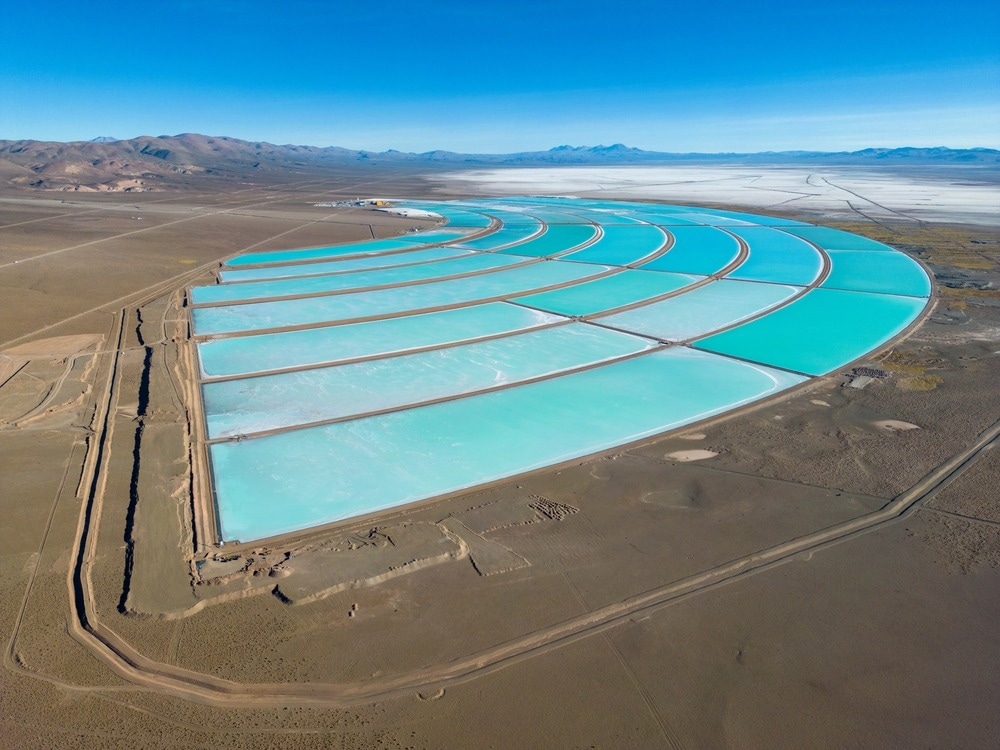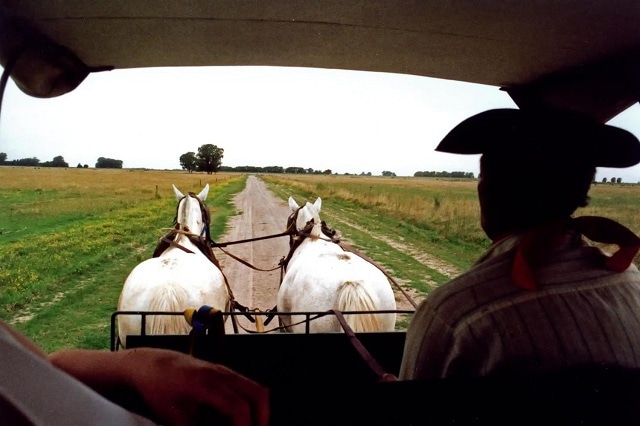The Argentine Republic, or Argentina, is a sparsely populated country on the continent of South America, with an estimated population of 46.6 million. It is the 8th largest country in the world, with an area of 2.8 million sq km covering most of the southern half of South America. Due to its length of almost 4000 km, the country's climate ranges from the north's rainforest-covered tropics to the south's sub-Antarctic conditions.

Image Credit: Freedom_wanted/Shutterstock.com
With a GDP of over $632 million, Argentina has the third largest economy in Latin America, behind Brazil and Mexico. The country is a leading food producer driven by its massive livestock and agricultural industries. It also has vast reserves of natural resources. Argentina has notable manufacturing and technology subsectors. Argentina is considered highly urbanized, with about 92% of the population in urban centers. The workforce is considered talented and educated. However, economic factors have hampered development and limited opportunities for individuals.
This article will give an overview of the major mineral resources present in Argentina, the mining industry's evolution, and what the future may hold for mining in Argentina.
Resources in Argentina
A century ago, Argentina was one of the world's richest countries due to its natural resources. However, political and economic turmoil have troubled the nation for more than 75 years, making it difficult for the country to exert its economic might.
In 2017, mining and quarrying contributed around 3% to the country’s nominal GDP, equivalent to about $19 billion. In 2022, Argentina’s mining exports totaled around $3.8 billion. According to the International Trade Administration at the US Department of Commerce, Argentina can expand production to achieve exports of more than $18 billion by 2030.
The country's important mineral resources include gold, lead, zinc, tin, copper, iron ore, manganese, petroleum, uranium, and lithium. As a recognized ‘middle power’ with a ‘very high’ human development index rating, Argentina has a stable government and secure mining policies and legislation. In a forward-thinking move toward sustainability, a law was passed in 2010 forbidding mining in and around the large glaciers in the south of the country.
In 2016, the newly elected government removed a 5% tax on all mineral exports that had been in place since 2007. The government also adopted a decree that removed export duties on semifinished and raw gold and silver.
Most of Argentina's mining is open-pit, and only two underground mines are currently open, partly due to the country's lack of contractible drilling companies. In 2018, the country joined the Extractive Industries Transparency Initiative, a global standard for responsible oil, gas, and mineral extraction governance.
In addition to traditional mining products, Argentina produces more biofuel than any other country. For 2018, the country reportedly produced more than 70,000 barrels per day in biofuels, equaling 2.7% of global production.
COVID-19 and its Effects on Argentina Mining
While the COVID-19 pandemic devastated Argentina, as it did every other country, Argentina’s economy did bounce back from the depths of the pandemic. According to the World Bank, its GDP increased by 10.4% from 2020 to 2021 and by 5.2% from 2021 to 2022.
The COVID-19 pandemic and associated lockdowns severely affected the country’s biofuel sector, with repercussions still ongoing.
Before the pandemic, Argentina had 19 bioethanol plants and 33 biodiesel plants in operation, capable of producing 1.4 billion liters per year and 700 billion liters per year, respectively.
Industrial Minerals in Argentina
Argentina has a mining portfolio of 113 projects valued at around $30 billion. Copper projects represent more than 50% of that portfolio. According to the International Trade Administration, the country has the potential to increase its mining production fivefold over the next decade.
In 2018, Argentina was the fourth-largest lithium producer after Australia, Chile, and China. Lithium is found in solutions or brines that are extracted via aquifers. It is estimated that Argentina contains more than 80% of the world’s lithium brine reserves just in the Puna Plateau in the northwest.
More than 70% of Argentina’s lithium deposits have not been prospected, but lithium mining is the fastest-growing mining sector. Lithium is essential in the battery and car manufacturing industries, and due to this, lithium exploration has significantly increased in the country.
Argentina also exports a massive amount of lithium from its mines, with the United States and Japan being two major importers of the mineral. In 2022, the country exported 44,000 tons of lithium, valued at nearly $700 million.
One of Argentina's four most important mining projects is lithium, the Salar del Hombre Muerto-Fenix Project. This is owned by Minera del Altiplano SA (FMC Lithium Co.).
These brines are also rich in boron and potassium. Boron is also present in large quantities from lithium brine and other sources. In 2020, Argentina was the seventh-largest producer of boron, according to estimates from the USGS.
Argentina is also approximately the world’s fourth-highest producer of strontium derived from celestite.
Cadmium is extracted in economically viable amounts and can be used in the manufacturing sector.
Metals in Argentina
Important metals found in Argentina are copper, gold, silver, and zinc. The region of Argentina adjacent to the Andes is possibly one of the world's most metal-rich areas.
In 2017, Argentina produced nearly 61,000 kilograms of gold, 48% of which was produced in the Santa Cruz province. That same year, $100 million was spent on gold exploration, or approximately 62% of the country’s spending on nonferrous metals.
The country’s overall investment in exploration of $160 million in 2017 was the fifth-highest in Latin America, behind Chile, Peru, Mexico, and Brazil. The Bajo de la Alumbrera mine, owned by Minera Alumbrera S.A., produces copper and gold. In 2017, the company closed the mine’s open pit operations while continuing its underground operations.
The ongoing closure spelled a 60% decrease in copper production from 2016 to 2017. But as open pit mining at the Alumbera mine has been winding down, several other copper mining projects have been in development. As these copper mining operations come online, they are expected to produce around 10,000 jobs.
Despite being a significant part of Argentina’s mining sector, aluminum production in the country is carried out entirely by Aluar. The company, and therefore the entire aluminum sector, had to cut production due to COVID-19. Before the pandemic, about 70% of the company’s production was exported to the United States, Japan, Brazil, and Germany.
Fossil Fuels in Argentina
While Argentina is not a major international producer of fossil fuels, in 2018, it was one of four countries to develop shale gas. Though little coal is mined in Argentina, natural gas and crude petroleum are essential resources.
Argentina's proven oil reserves are the 32nd highest globally, estimated at around 2.5 billion barrels. In 2021, the country was estimated to have produced 690 million barrels of petroleum per day and consumed around 680,000 barrels each day.
Argentina is the 35th largest proven national reserve of natural gas, with around 396,000 million cu m. Uranium, which can be used as a fuel in nuclear energy, is also present in minable amounts. In a dispute with the United Kingdom, Argentina claims sovereignty over the Falkland Islands, or Islas Malvinas, a small group of islands off the coast of mainland Argentina, currently being explored for oil and gas reserves.
Argentina renewed its claims over the islands in 2012, with leaders saying they would be Argentina's property within two decades. In 2016, Argentina and the UK decided to cooperate and positively engage to improve the economic growth and development of the Falkland Islands.
In 2020, British Prime Minister Boris Johnson reportedly said his country would use military force to ensure the security of British citizens in overseas territories, including those in the Falkland Islands.
Argentina’s Investment in Mining
Despite the wealth of resources, mining has not traditionally been a big business in Argentina, and the country has been more focused on farming.
Until the 1990s, most mining was geared toward the construction industry. However, in recent years, this has shifted slightly.
In 1992, the government opened the mining sector to private companies, leading to a rise in international trade, investment, and exploration. The mineral industry includes domestic and foreign mining operations, and the country does not restrict foreign mining investment.

The rich, fertile ground of the pampas plains has traditionally been the primary source of wealth for the people of Argentina. Image Credit: US Department Of State.
Argentina's mining exports have increased substantially since the 1970s. In 2017, exports of mineral products equaled $4.2 billion, an increase of $500,000 from 2016. This represents 7.1% of Argentina’s total exports.
For 2017, the leading nations that Argentina exported to were Brazil (16%), China (7%), and the US (8%). Exports to the US were valued at $4.7 billion, with coal and related fossil fuels representing nearly $740 million and aluminum representing more than $510 million.
Mining in Argentina has many perceived benefits. The mining market is transparent and easy to access, and foreign and domestic investors are encouraged. Due to the country's size, large areas have not been fully explored, and junior exploration companies can benefit from this.
References and Further Reading
United States Geological Survey. (2023) 2017-2018 Minerals Yearbook ARGENTINA [ADVANCE RELEASE]. [online] Available at: https://pubs.usgs.gov/myb/vol3/2017-18/myb3-2017-18-argentina.pdf (Accessed 14 November 2023) Bradley, C. (2021) Falklands: Argentina claimed islands will be theirs by 2033 despite Boris Johnson's vow. Express, 16 March [online]. Available at: shttps://www.express.co.uk/news/uk/1410699/falklands-news-argentina-islands-2033-boris-johnson-uk-spt (Accessed: 5 April 2021)
CIA. (2023) The World Factbook – Argentina. [online] Available at: https://www.cia.gov/the-world-factbook/countries/argentina/. (Accessed14 November 2023)
NS Energy Staff Writer. (2019) Top five countries for biofuel production across the globe. NS Energy, 15 November [online]. Available at: https://www.nsenergybusiness.com/features/top-biofuel-production-countries/. (Accessed 5 April 2021)
United States Department of Agriculture. (2020) Argentina: Biofuels Annual. [online] Available at: https://www.fas.usda.gov/data/argentina-biofuels-annual-5. (Accessed 5 April 2021)
Reuters Staff. (2017) Argentina court orders suspension of Glencore's Alumbrera mine. Reuters, 11 July [online]. Available at: https://www.reuters.com/article/us-glencore-argentina-suspension/argentina-court-orders-suspension-of-glencores-alumbrera-mine-idUSKBN19W2RT. (Accessed 5 April 2021)
Deaux, J. (2020) Aluminium among first virus-related output reductions in Argentina. Bloomberg News, 30 March [online]. Available at: https://www.batimes.com.ar/news/economy/aluminum-output-cuts-in-argentina-among-first-related-to-virus.phtml. (Accessed 5 April 2021)
The World Bank. (2023, April 3). Argentina Overview: Development news, research, data | World Bank. Retrieved from https://www.worldbank.org/argentina
International Trade Administration. (2023, November 2). Argentina - Mining - International Trade Administration. Retrieved from https://www.trade.gov/argentina/mining
Disclaimer: The views expressed here are those of the author expressed in their private capacity and do not necessarily represent the views of AZoM.com Limited T/A AZoNetwork the owner and operator of this website. This disclaimer forms part of the Terms and conditions of use of this website.